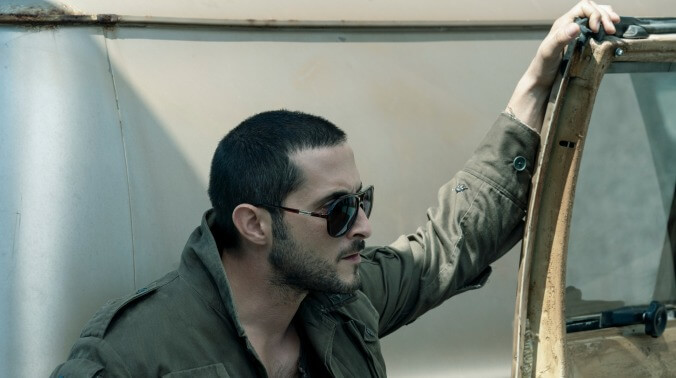The Boys’ Frenchie backstory is one of TV’s best uses of flashbacks since Lost


This post discusses plot points from The Boys seasons one and two.
“The Bloody Doors Off,” the sixth episode of The Boys’ superb second season, is undeniably the pivot point of the entire narrative. Not only do we learn that Vought International has been secretly working to stabilize compound V, to make it safe to inject into any adult human and immediately turn them into a super (and have tortured and killed untold numbers of test subjects in the process), we discover why: Stormfront was the wife of Frederick Vought himself. The seemingly millennial super is actually a 100-year-old Nazi, and she’s shepherding the company’s research in order to create a race of white-supremacist supers with the intent of creating a fourth reich. That’s one hell of a reveal.
But the reason the episode is the best argument the show has yet made for its unexpected pathos has almost nothing to do with any of that; instead, it’s all about Frenchie. Tomer Capon’s wisecracking science and weapons expert spent much of the first season as a cypher with a messy past. We didn’t know much about his checkered history (aside from a complicated relationship with his ex, Cherie), and he mostly served in a capacity to help drive others’ stories forward. That all changed in “The Bloody Doors Off”: We get the story of Frenchie’s life, and it’s a tragedy that gives him arguably the most complex perspective of any of these characters. Not only that, but the way the story unfolds—criss-crossing past and present, weaving them together to make both sides equally alive and rich—is among of the best use of flashbacks in genre TV since the heyday of Lost.
For much of the first half of the season, Frenchie wasn’t given a terribly large amount of material. He visited Cherie, he did drugs, and generally appeared to be in something less than great shape. As it turns out, these breadcrumbs were laying the foundation for a potent character study. His pining for Kimiko seemed to be a strange admixture of attraction and paternalistic over-involvement in her life, in ways that didn’t fully make sense. Why was this guy so hell-bent on wedging himself into her existence and dictating her choices? But there’s a loss at the center of Frenchie that has dictated all he has done. Just as important, it represents the symbolic core of why the Boys fight supers, in a more relatable way than Butcher’s single-minded zeal, or even Hughie’s earnest do-gooderism. (As Annie notes, Hughie is “too good for us”—“us” being everyday folks who aren’t quite so noble at all times.)
Before they infiltrate the Sage Grove facility, Frenchie is still giving Kimiko shit for briefly disappearing to do some killer-for-hire work. Without any real insight into her motivations save for his own presumptions, he looks down on her for a decision made in the depths of heartbreak. “This is what you bought with your blood money?” he sniffs, gesturing at her brass knuckles that read, “BOSSY.” She refused to be the damsel in distress, the grieving and damaged woman he could nurse back to health and set on the right (read: his) path, and instead of respecting her grief, he scorns her for it. It’s not a great look.
But we learn why he’s so insistent with his paternalism: He came by it honestly. Eight years ago, Frenchie was the father figure of sorts to Cherie and Jay, his girlfriend and best buddy, though the three seem to have more fluid roles than that. They’re a makeshift family like The Golden Girls, as he notes in the opening flashback of the episode—women who “made their own family,” like Frenchie has done with his two life partners, in a very real way. And he is the self-appointed head, the brains behind their crimes that keeps the trio flush in cash and drugs. So when he’s busted by Mallory and given a simple choice—either go to work for her or Cherie and Jay will be locked up in a Supermax prison—it’s no choice at all. He sees everything he does as in the service of protecting his family.
Which is what makes his impossible choice all the more tragic. By abandoning his mission to go save Jay from a potentially fatal overdose, Frenchie isn’t there when Lamplighter goes to Mallory’s house and accidentally kills her grandkids while trying to take her out. Had he stayed on his post, he could have sounded the alarm that saved them, or possibly even stopped Lamplighter before he made the assassination attempt. But in choosing his family over the job, he failed to protect those kids, and shoulders the guilt of their deaths. (Ironically, Lamplighter also uses Frenchie’s actions to displace some of his own guilt at being the one who executed them: “Why didn’t you stop me?” he pitifully demands, as though Frenchie is the true culprit.) Worse still, his actions end up costing him that family: By returning to his mission, Cherie and Jay think he’s abandoning them. They leave, and Frenchie never sees Jay again—plus, his hard choice turns out to be for naught, as Jay dies of another overdose just a few months later.
That’s the key to understanding the pathos of the series’ pack of antiheroes. In trying to be loyal to both of his makeshift families, Jay/Cherie and the Boys, Frenchie lost both. Billy, MM, and Hughie all have crystal-clear and conscience-free personal reasons to be taking down supers. But Frenchie lost everything in trying to protect everyone, and now, he feels a permanent sense of ostracism even among his seeming friends. His motivation stems from a need to regain what he’s lost, not punish others for taking it from him—he wants a chosen family, and a life freed from the burden of guilt that has suffused it. But by chasing that same previous role of paternal caretaker, he’s obscuring his view of the new state of affairs, in which he’s just one of the damaged souls trying to make their own way in this group of revenge-seeking roughnecks. He can’t go back to the way things were, and he can’t ever regain what he lost, despite longing for it all these years. That’s a far more powerful and affecting well of pathos than the painful but culpability-free positions enjoyed by the others. Frenchie is a walking Greek tragedy.
The way the show weaves in this loss makes it all the more potent. The flashbacks to Frenchie’s history aren’t just dropped in throughout the contemporary story, dual narratives running side by side to get through them both in an efficient manner. The Boys smartly links the past chronicle to present one, using it to enrich and lend meaning to the group’s caper at Sage Grove. It does this right from the start, as Frenchie’s Golden Girls-inspired paean to his self-chosen family smash-cuts to him in the present, taking a power saw to Annie’s neck in hopes of freeing her from Vought surveillance—the effort to help Annie is a caretaker role. Just as his prior life saw him taking the active job of keeping his family safe, now he’s recapturing a bit of that same magic.
As the episode progresses, we see Frenchie’s undoing in the past shade into his trauma in the present. After being told to “stick to the plan” by MM—the very thing he didn’t do five years ago, leading to disaster—Lamplighter and Frenchie finally have it out, and the show cuts to the night in question, placing Frenchie’s impossible choice front and center. He reveals the truth about what happened that night, and we get the exchange that embodies the entire nature of Frenchie’s character, as well as the poignancy at the heart of the story. “Why didn’t you tell us?” MM asks, finally seeing his former friend in a new light. “We would’ve let you off the hook.” Frenchie’s reply says it all: “What makes you think I want to be let off the hook?”
With that, a new dynamic enters the group and shifts the manner of their escape from Sage Grove. As a result of learning Frenchie’s story, Lamplighter doesn’t give away their presence to Stormfront. Kimiko is receptive to Frenchie’s subsequent apology for his behavior. Lamplighter turns himself in. In other words, the present narrative changes as a result of the past one, the two bound together in ways that transform and push forward the narrative, instead of merely filling in the gaps of Frenchie’s backstory. And it does so while capturing the tragedy of his humanism, revealing him as a character whose internal guilt has shaped his actions as strongly as any sense of moral justness.
Frenchie is more than just a guy seeking retribution. He feels a responsibility to the losses in the past, and is torn by a sense that sometimes, there’s no such thing as the right thing to do. That even your best efforts will not only fail, but doom everyone and yourself in the process. It’s an anxiety to which anyone who’s ever let down another person can relate. A sense of personal failing despite the seeming helplessness inspired by a world of super-powered evil is more than super: It’s all too human. And it’s given The Boys a newfound depth of soul and empathy often missing from its go-for-broke nihilism.